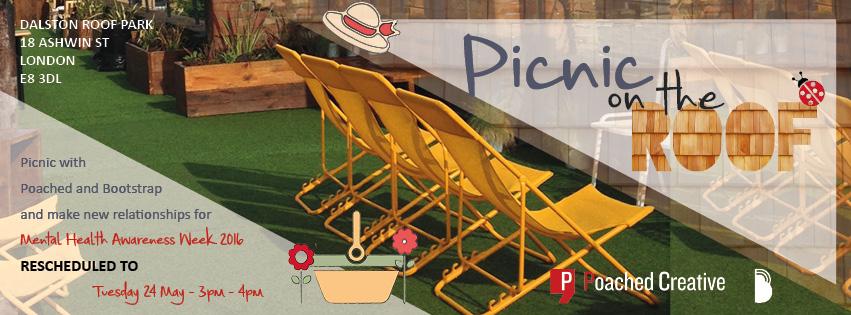How to be a mental health friendly workplace
How to be a mental health friendly workplace

On Tuesday our workplace is closing early. Staff, trainees and volunteers will be joining with other Bootstrap tenants and organisations we work with for an afternoon picnic on the roof.
It’s not that we’re not busy on Tuesday. We are! But we recognise the need to stop sometimes, get out of the office and make time to build our working relationships in a social way.
Relationships at work are some of the most significant in our lives and they can have a dramatic affect – positive and negative – on our mental health and wellbeing.
Building relationships both inside and outside our organisation is important for Poached Creative, not least because many of us have first-hand experience of mental health conditions.
It turns out we’re not alone. Across the country, one in six employees are currently experiencing mental health issues, which means almost everyone works with someone who is having a hard time.
Mental health problems such as stress, anxiety and depression are now the biggest cause of sickness absence from work and employee relationships with their direct line manager are a huge factor in how people feel about their work.
“Are you listened to at work, do you have any control in your workplace? These are the things that keep us well and mentally well in our workplace,” says Dame Carol Black, senior government adviser on health and wellbeing.
She also says good work is good for you, and we have some great examples in our trainee stories of how our trainees have thrived in the right work environment.
Like many social enterprises that aim to help people into employment, Poached Creative sets out to build a supportive workplace.
So what does that look like in practice?
Starting with the person
- find out personal and professional goals and desires
- link these to knowledge and skills
- show how we’ll support this development.
Flexibility and understanding
- discuss problems or concerns without judgement
- offer flexible working hours and days
- ask about adjustments and carry them out.
Knowing where we stand
- provide clarity with contracts, policies and job descriptions
- review these with staff, trainees and volunteers regularly
- explain how roles fit with the team and contribute to our plans.
Encouraging learning and input
- use coaching and mentoring to accelerate learning
- daily huddles for work planning and feedback
- monthly staff meetings and annual away days.
Supporting one another
- develop a culture of helping one another
- openly talk about mental health in the office
- ask open questions about how people are feeling.
Being social
- monthly socials planned with the team
- invitations for past trainees and volunteers to celebrate with us
- opportunities for partner organisations and friends to attend our events.
We’re still looking to improve so we were pleased to come across a new toolkit this week from our friends at Business in the Community and Forster Communications that walks small organisations like ours through the steps to a working culture that supports good mental health. Find this and more resources on our mental health in the workplace pinboard.
Our original picnic plans were scuppered with a downpour on Wednesday, which means we’ve just missed Mental Health Awareness Week, but we see no reason not to continue the awareness raising beyond it. Come and join us!

